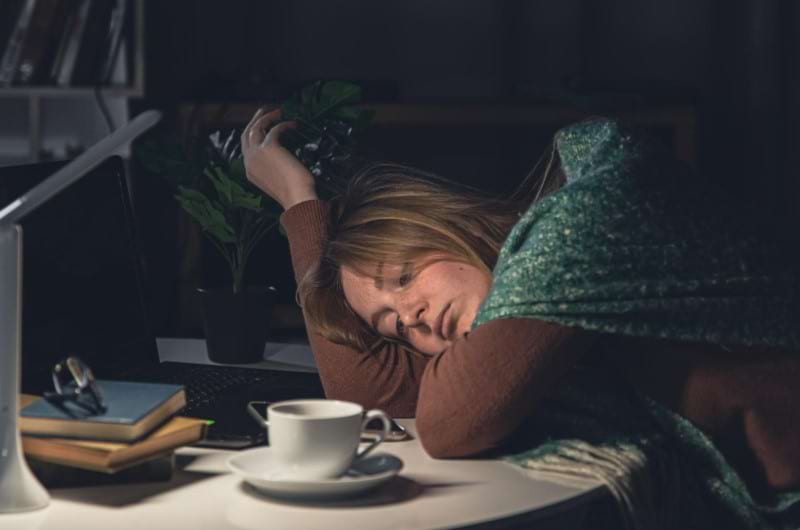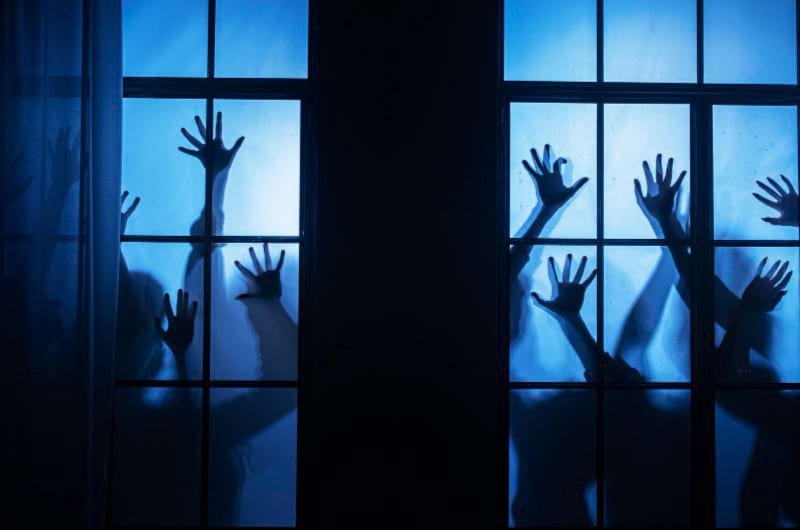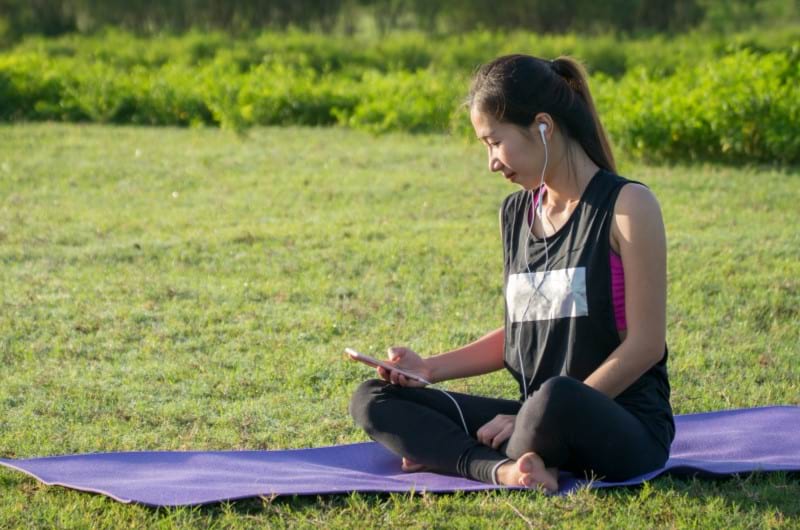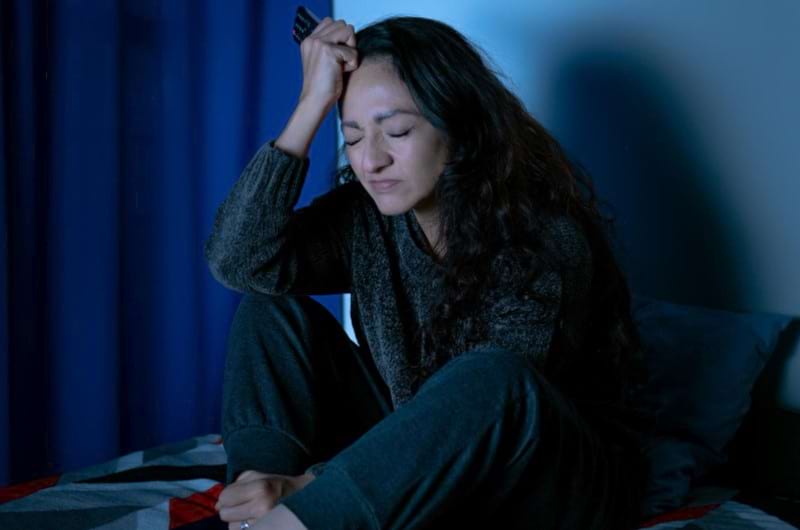Anxiety can easily take over your mind at night because you have fewer distractions. It can cause nightmares, panic attacks, night sweats, heart palpitations, chest pains, shallow breathing, and headaches. These symptoms make sleeping challenging, resulting in exhaustion, less productivity, and higher stress levels the following day. Performing coping strategies can help you manage your symptoms and improve sleep quality.
We feel nervousness, tension, and uneasiness when we fear or worry about something. These are signs of anxiety, our body’s natural response to stress.
As a human being, it’s normal to feel anxious. But sometimes, anxiety can lead to a chronic mental disorder, impacting your daily and nightly life.
Have you had trouble sleeping at night because of the many thoughts that flood your mind? It keeps you awake?
It could be the things that happened during the day or the ones you anticipate doing the next morning.
Your body sees these as stressors that trigger the release of adrenaline, keeping your body awake and leading to nighttime anxiety.
How does anxiety at night affects you?
Maybe you had a rough day at work or a stressful morning. These feelings can stay with you overnight, causing your anxiety to flare up.
Nighttime anxiety can ruin your mental and physical health.
You’ll create this loop which involves a lack of sleep resulting in exhaustion the following day.
When you’re exhausted, you can’t perform your daily tasks well, making you less productive. It can become stressful, giving you more anxiety at night.
To put it in simple words, anxiety causes a lack of sleep and, in turn, can worsen your anxiety.
Causes of anxiety at night
The reasons for nighttime anxiety are no different from anxiety that happens in the morning.
However, your anxiety may become more noticeable or worse at night due to the following:
1. Fewer distractions at night
Have you ever noticed that scary thoughts creep into your head as soon as the lights turn off, and you can’t seem to shush them away?

Well, the night offers lesser distractions than you have during the day.
People are usually busier in the morning, which gives them ample distractions to escape their anxiety from kicking in.
In addition, your brain doesn’t have enough energy to deal positively with your worries and cope with intrusive thoughts, worsening your anxiety.
2. A stressful day
Your daily life events can impact how well you sleep at night.
Remember how you’d fallen asleep on the night after an awesome date? You had a sound sleep, and you felt terrific the following day.
But did you have a good night’s sleep when you knew you were failing your final exams? The answer is probably no.
Stressful events can stay with you overnight.
Your mind may beat you up for it, torturing you with horrific images or endless possibilities, making it difficult to fall asleep.
The following are some examples of stressful life events:
- Relationship issues
- Financial status
- Work-related stuff
- Health conditions
- Traumatic events like a physical or emotional injury
3. Overthinking
It’s usually the fear about what’s coming, whether it seems unlikely or not to happen, that gives most people anxiety.
During the night, it’s easy for your mind to overthink many possibilities. It steals your mind the chance to relax or quiet down to sleep.
Overthinking is normal, but when it happens excessively, even on minor things, it could be a symptom of chronic anxiety or depression.
4. Other physical and mental health conditions
If you suffer from sleeping disorders like insomnia or sleep apnea, constant lack of sleep can become overwhelming.
It causes you to worry about how you will function the next day. On the other hand, nighttime anxiety may also lead to insomnia.
Physical conditions such as hormonal imbalance, gastrointestinal issues, chronic illnesses, and pain and discomfort make you more anxious about your overall health.
Mental health conditions like panic disorder can give you nocturnal (nighttime) panic attacks.
It may wake you up at night, making it hard to fall back asleep and resulting in anxiety flare-ups.
Mental illnesses like generalized anxiety disorder (GAD), post-traumatic stress disorder (PTSD), social anxiety disorder, and depression may cause nightmares, disrupted sleep, and more anxiety.
5. Substance use disorder
This disorder is often known as “drug abuse” or “addiction.”
Drugs and alcohol can change and impair your brain chemistry, function, and motor skills.
These substances can also affect your body’s sleeping patterns, leading to interrupted, poor-quality sleep.
Sometimes, certain medications may also cause anxiety, especially when there is an increase in the dosage intake.
Symptoms of anxiety at night
Symptoms of nighttime anxiety are typically the same as when you experience it during the day. But, for some people, they may be worse during the night.
The following are symptoms of nighttime anxiety:
1. Nightmares and difficulty sleeping

Your fear, worries, and negative thoughts often prompt anxiety.
These can fill your mind overnight, causing nightmares that can wake you up in the middle of your sleep.
It will also make falling back asleep more complex, resulting in sleepless nights.
Lack of sleep results in fatigue, irritability, and unproductivity during the day.
2. Physical symptoms
During bouts of stress, anxiety kicks in, activating your body’s “fight-or-flight” response.
It interferes with your bodily functions, causing discomfort and disrupting sleep.
As a result, you may experience the following symptoms:
- Heart palpitations or chest pains and tightness
- Difficulty breathing
- Night sweats, chills, and hot flashes
- Dizziness or lightheadedness
- Headaches
Anxiety causes your body to release hormones, resulting in muscle tension, aches, pain, and weakness.
3. Panic attacks
Nighttime anxiety may trigger nocturnal panic attacks.
It has the same signs and symptoms as regular panic attacks but occurs when you’re asleep. It makes you feel like you’re out of control.
4. Ruminating and uncontrolled thoughts
Your mind keeps thinking about things that could go wrong or make you worry and sad, like losing your loved one from a chronic illness.
Some common triggers are financial worries, a recent heated argument or dispute, or remembering past traumas.
When anxiety kicks in, you often lose control of your own thoughts.
How to cope with anxiety at night?
If you are suffering from anxiety at night, here are several things you can do to cope with it and its symptoms:
1. Healthy sleeping habits
You will significantly improve your sleep quality when you make habits that make you feel happy and comfortable in your bedroom.
Healthy sleeping habits may include the following:
- Taking a relaxing, hot shower for 90 minutes every night.
- Getting a comfortable sleeping mattress and pillow.
- Making your bedroom clean, quiet, and comfortable.
- Setting your bedroom temperature to around 70°F (20°C) or whatever you prefer.
- Relax your mind by listening to soft music, reading a book, journaling, meditating, etc.
- Avoid caffeine late in the day.
2. Try relaxation techniques

Doing activities that can calm your body and mind will significantly help your nighttime anxiety.
Start practicing relaxation techniques like box breathing, mindful meditation, yoga, and muscle relaxation exercises.
3. Practice mindfulness
Being mindful of your thoughts will help you become aware of what’s happening in your present moment.
Your anxiety may cause you to lose your grip on the present time.
It allows your mind to slip away, inviting horrible thoughts that happened in the past or can happen in the future.
Practicing mindfulness will let you create more space to think and breathe and redirect you toward the present moment.
You can try the 3-3-3 rule. It will help you ground your emotions and calm them down whenever intrusive thoughts creep into your mind. You can do it by:
- Pick out three objects. Take a look at each of their every detail and describe them.
- Stop and listen to three sounds. Try to identify them and describe what and how they sound like or where it’s coming from.
- Touch and move three things. You can do this on some body parts, like your limbs or objects in your surroundings. Take time to feel your sense of touch.
You can also try the 5-5-5 method. It’s a simple breathing exercise that involves the following steps:
- Breathe in for 5 seconds.
- Hold your breath for 5 seconds.
- Breathe out for 5 seconds.
Repeat these steps for as long as you need until your thoughts slow down.
4. Exercise regularly
Exercising can improve your overall health and sleep quality. It helps your body release hormones which can help reduce anxiety and improve your mood.
However, please don’t do it late in the day because exercising can stimulate your body’s alertness which can cause you trouble sleeping.
5. Avoid caffeine and alcohol
Caffeine can enhance your focus, and drinking it late in the day may stimulate your body and mind, stopping it from naturally relaxing during the night.
On the other hand, drinking alcohol can interfere with your body’s melatonin production, which is vital to sleep.
Moreover, it can worsen sleep apnea symptoms and disrupt your sleeping patterns.
6. Try alternative or complementary treatments
Some available treatment options can alleviate pain caused by anxiety, like acupuncture, massage therapy, and chiropractic therapy.
7. Practice daily stress management
Managing daily life stressors can help ease symptoms of your nighttime anxiety.
You can develop strategies like effective time management, seeking help with household chores, and consulting professionals to manage your financial or legal issues.
8. Seek medical help
Talk to your physician to evaluate your symptoms, prescribe medications, and refer you to a mental health specialist.
When your nighttime anxiety doesn’t improve through lifestyle changes or alternative treatments and home remedies, you should seek medical help immediately.
References
- https://www.mayoclinic.org/diseases-conditions/panic-attacks/symptoms-causes/syc-20376021
- https://www.medicalnewstoday.com/articles/321805
- https://www.mindful.org/how-to-practice-mindfulness/
- https://www.healthline.com/health/chiropractic-benefits


